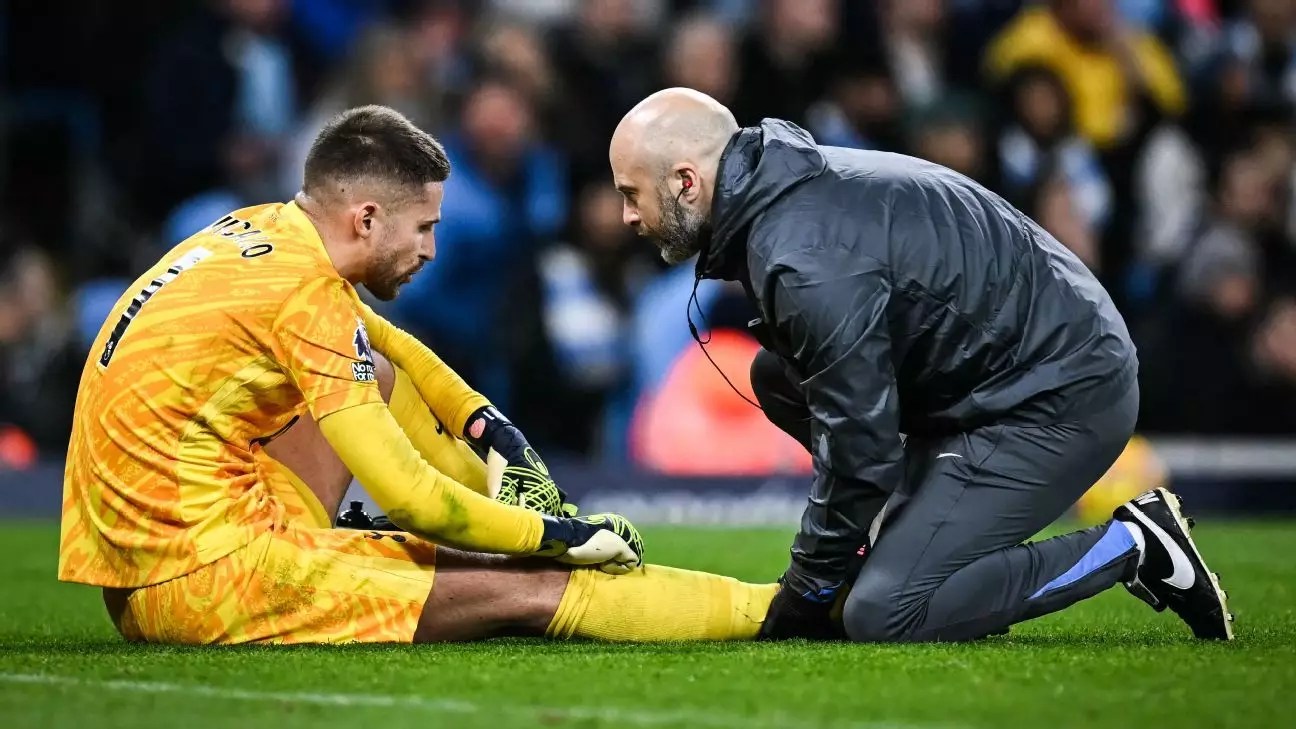In the world of professional sports, injuries can dramatically alter the course of a team’s season. For Tottenham Hotspur’s goalkeeper, Guglielmo Vicario, a shocking revelation came to light following an incredible performance during Spurs’ commanding 4-0 victory over Manchester City. On that fateful day, Vicario played through the pain of a fractured ankle, demonstrating a level of toughness that has left both colleagues and supporters in awe. Head coach Ange Postecoglou expressed his surprise when he learned about the injury, praising Vicario’s commitment and resilience.
The collision that led to Vicario’s injury occurred just before halftime, yet he managed to forge ahead and complete the match. This decision isn’t just indicative of a player’s grit; it showcases Vicario’s determination to contribute to the team’s success no matter the personal cost. Even in a moment of physical distress, he remained focused and continued to make key saves, helping his team fend off any potential resurgence from City. Such a display raises questions about what it means to be tough in modern sports. Is it merely playing through pain, or does it speak to a deeper sense of responsibility to one’s team and the sport itself?
Understanding Toughness
Vicario’s performance under duress serves as a powerful reminder of the mental toughness required in professional football. The comments from Postecoglou highlight that toughness isn’t simply physical; it’s a mentality that allows athletes to perform under pressure, even when dealing with injuries. “Tough as nails,” as the coach put it, encapsulates Vicario’s essence in that crucial match. However, is it wise to push through injuries without consideration for long-term health? As modern sports continue to evolve, the conversation around athlete well-being and medical awareness grows in importance.
Injury Updates and Team Dynamics
Following the match, Tottenham confirmed that Vicario underwent surgery and faces an extended recovery period. The prognosis is sobering; he is expected to be unavailable for several months. In the wake of this news, the focus shifted to how the Spurs will address his absence. Backup goalkeeper Fraser Forster is anticipated to step up during this challenging time. Forster’s experience adds a layer of security to the squad, yet the daunting challenge remains—how do teams recover from losing a pivotal player in the heat of the competition?
While the primary focus remains on Vicario’s recovery, his situation serves as a testament to resilience—both personal and collective. Postecoglou’s acknowledgment of the injury as a setback resonates with any team navigating adversity. As they prepare for upcoming fixtures in the Europa League, Tottenham must rally together to compensate for Vicario’s absence while maintaining their competitive trajectory. With matches against teams like Roma on the horizon, the pressure mounts, and finding that camaraderie is essential.
Adding another layer to the narrative, Postecoglou’s perspective on the managerial landscape is also noteworthy. Ahead of their match against Roma, he paid homage to Claudio Ranieri, the veteran coach who knows the game intricately. This interaction highlights the broader human connections within football, reminding us that even amidst intense competition, respect and admiration for the game—and those who shape it—are paramount. Postecoglou’s eagerness to connect with a coaching stalwart illustrates the importance of mentorship and legacy in football.
The Path Ahead
As Tottenham plans for a future without Vicario, the essence of his character will likely linger in the squad. The lessons learned from this experience extend beyond physical injuries; they encapsulate a warrior spirit, community support, and the shared journey of overcoming obstacles. With a renewed focus on resilience and team collaboration, Tottenham must adapt and rise to the challenge, drawing inspiration from the very player whose perseverance has captured their hearts. In the end, while the absence of Vicario is a significant blow, it is through challenges that teams often find their greatest strength.


Leave a Reply